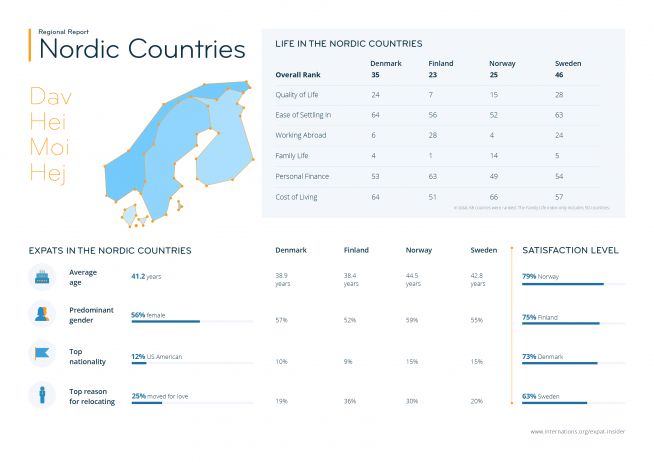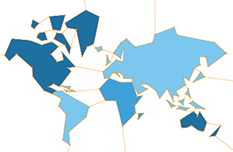Safe & Healthy Family-Friendly Living in the Nordic Countries
- The Nordic countries are a top region for families.
- The Nordic cultures are not the most friendly.
- Finland and Norway are among the healthiest countries in the world.
- Sweden struggles in the rankings.
Feeling Safe and Healthy in the North
The Nordic countries — Denmark, Finland, Norway, and Sweden — offer a decent expat experience: Finland and Norway are in the top 10 in several subcategories, and Denmark remains average, though Sweden falls behind. All in all, they have a good quality of life, doing well in the Health & Well-Being and Safety & Security subcategories, for example.
Finland and Norway even rank second and third for health and well-being, with Denmark and Sweden not too far behind, coming in 11th and 16th place out of 68. These destinations perform particularly well regarding the quality of the environment.
I love the exceptional quality of life and the environment in Finland.
The long-standing tradition of environmental protection in the Nordic countries, as well as support for renewable energy and efforts to address climate change, may be what helps boost this region: all countries rank among the top 10 for environmental quality, with Norway (1st out of 68) and Finland (2nd) within the top 3. A French expat points out how they “love the exceptional quality of life and the environment in Finland”.
Moreover, Finland and Norway rank among the top 5 for safety and security (5th and 3rd, respectively), standing out for peacefulness (95% positive ratings in Finland) and personal safety (96% positive responses in Norway).
Norway is clean, safe, and environmentally aware.
“Norway is clean, safe, and environmentally aware,” according to a British expat in the country. Political stability is another important factor in the subcategory: Denmark and Sweden perform relatively well, both in the top 15, though Sweden remains an outlier with a weaker personal safety ranking of 33rd out of 68.
Despite a pristine and generally safe environment, the Nordic region is not without its downsides. Personal happiness is not a highlight for any of these countries; they don’t score well for happiness with life in general: in Denmark, for instance, fewer than one in eight expats (12%) report being very happy. This stands in stark contrast to the results of the World Happiness Report, released annually by the United Nations Sustainable Development Solutions Network. In 2018, all Nordic countries appear in the top 10 happiest countries in the world, with Finland taking 1st place.
Nonetheless, settling in and making friends seems to be a common challenge among Expat Insider respondents in these countries.
Prepare for a Rough Welcome
Nearly all scores for the Nordic countries in the Ease of Settling In Index are within the bottom 10: Sweden and Denmark perform particularly poorly in this index, ranking 63rd and 64th, respectively. The most-cited main reason for relocating to the Nordic region is moving for love with up to 36% of responses. Therefore, it is rather ironic that these countries do not offer the friendliest atmosphere.
Denmark and Sweden rank within the bottom 10 for the Friendliness subcategory (61st and 66th, respectively), and Finland and Norway do not perform much better: fewer than a quarter of respondents in both Finland (24%) and Norway (17%) describe the local population’s attitude towards foreign residents as very friendly. A US American expat has “come to the unfortunate conclusion that while a country such as Denmark may have the very best infrastructure, healthcare system, education system, etc., as an expat, if you cannot connect with the local people and make friends, there is very little meaning or purpose to your life abroad.”
Living without friends can often mean living without purpose, and making friends as an expat in the Nordic region is clearly a challenge. All four Nordic countries rank in the bottom 10 for this factor. The same applies to making local friends, except for Finland, which scores a still unsatisfactory 57th. In Sweden, for instance, seven in ten expats describe it as difficult to find local friends (vs. 36% globally).
Denmark and Norway Take the Lead for Work
In the Working Abroad Index, there’s a difference between Denmark and Norway, on the one hand, and Finland and Sweden, on the other: Denmark ranks 6th and Norway 4th out of 68 destinations in the index. Finland (28th) and Sweden (24th) have more average results.
If you can manage to land a job and work full time, you will not be poor in Denmark.
The Work & Leisure subcategory shows no remarkable results for Finland or Sweden, either, while Norway receives slightly more satisfactory ratings. Top occupations in Norway are within the fields of healthcare (11%) and manufacturing/engineering (11%), with 41.9 full-time working hours per week — well below the average 44.0 hours.
Denmark, meanwhile, ranks first in this subcategory: half the respondents are completely satisfied with their working hours. One Romanian expat there shares that “if you can manage to land a job and work full time, you will not be poor. In spite of high taxes, you will have enough money for rent, expenses, food, and saving up a little something on the side. It is a system that truly works. Everyone who works stays well above the poverty line.”
Although it may not be that hard to get by with a full-time income, finding suitable employment in the first place can be a challenge. Career prospects in all four countries do quite poorly: Denmark ranks 42nd out of 68, Finland 56th, Norway 41st, and Sweden 57th. And for those who do find a job, overall job satisfaction is also rather low in Denmark (40th), Finland (46th), and Sweden (54th).
Not Easy on the Wallet
Though life in Northern Europe may not ruin you financially, the cost of living is among the highest out of all 68 countries. All four destinations score well below average in the Cost of Living Index: Norway does worst, ranking 66th out of 68, Denmark ranks 64th, and Sweden and Finland trail not far behind in 57th and 51st place, respectively. “Transportation in Sweden is expensive, but owning a car is also expensive,” according to a Bulgarian expat in Sweden.
Transportation in Sweden is expensive, but owning a car is also expensive.
The Personal Finance Index offers better scores for these countries, though not by much — Finland has an especially low performance with an overall rank of 63 for personal finance. Sweden (54th), Denmark (53rd), and even Norway (49th) do not rank quite so poorly, specifically when it comes to the respondents’ financial situation.
More than four in five expats in Denmark (83%) have about or more than enough disposable household income to cover daily costs. Household incomes can be quite high in some countries: nearly one in three expats in Norway (32%) have a gross annual income of at least 100,000 USD.
An Affordable Family Life
Overall, the Nordic countries take gold for family life. Even 2018’s “biggest loser” Sweden performs well, ranking 5th out of 50 in the Family Life Index. Finland, unsurprisingly, comes first, with Denmark not far behind in fourth place.
Any Nordic country seems to be a good destination for expat families. The cost of childcare and education in the Nordic countries tends to be a benefit for expat parents: Norway holds the lowest rank, though it still sits at an impressive 7th place out of 50 countries.
Beyond affordable childcare, the Nordic countries also have great parental leave laws, giving many expat parents further satisfaction in their family life, including this US American expat in Sweden: “Not having to worry about healthcare expenses was like having a great safety net when I had trouble during my pregnancy. I have really enjoyed being a part of a society that lets the dads be fully involved parents. Having my husband take parental leave was the best thing ever for truly sharing housework and childcare.”
Education is also highly rated. Between 40% and 67% of expat parents send their children to a local state school: Finland even takes first place regarding the quality of education, and except for Norway, education options are said to be numerous in the Nordic countries.
Further Reading
- Nordic Co-operation. Nature and the Environment. Facts about the Nordic Region. 24 Jul 2008.
- The Independent. Sweden on Target to Run Entirely on Renewable Energy by 2040. 26 Oct 2016.
- Climate Change Post. Climate Change Adaptation: The Nordic Countries in a Global Perspective. 14 Sep 2016.
- World Happiness Report 2018.
- OECD. OECD Family Database – Key characteristics of parental leave systems. 26 Oct 2017.
- Expat Insider 2018 — The Biggest Winners & Losers
- Expat Insider 2018 — Where Happy Expat Families Live
- Expat Insider 2018 — The Best & Worst Places for Men and Women
- Expat Insider 2018 — Finland, Israel, and Czechia Top for Family Well-Being
- Expat Insider 2018 — Digital Expat Havens around the World
- Expat Insider 2017 — Happy Families under the Northern Lights
- Expats in Denmark
- Expats in Finland
- Expats in Norway
- Expats in Sweden




